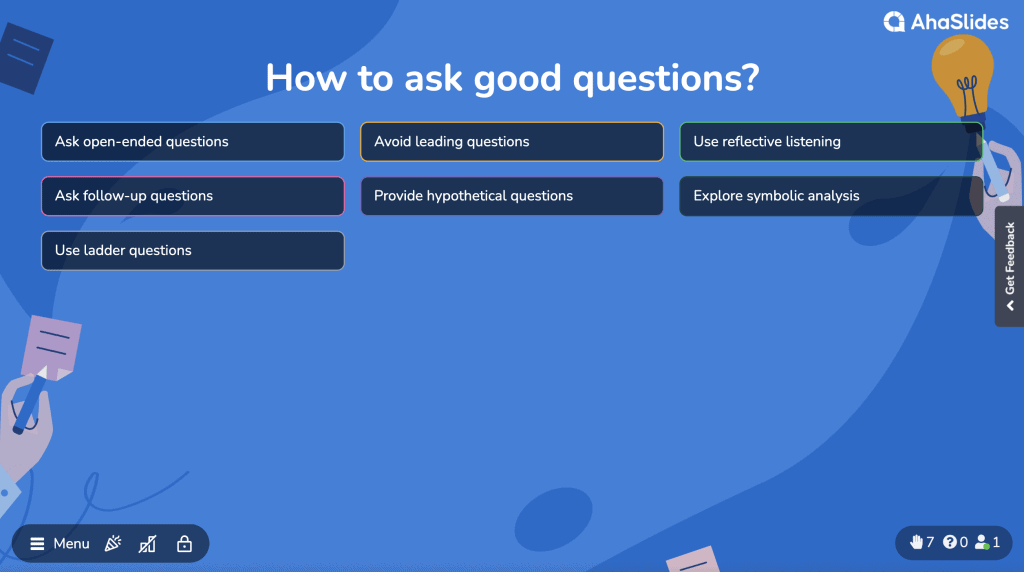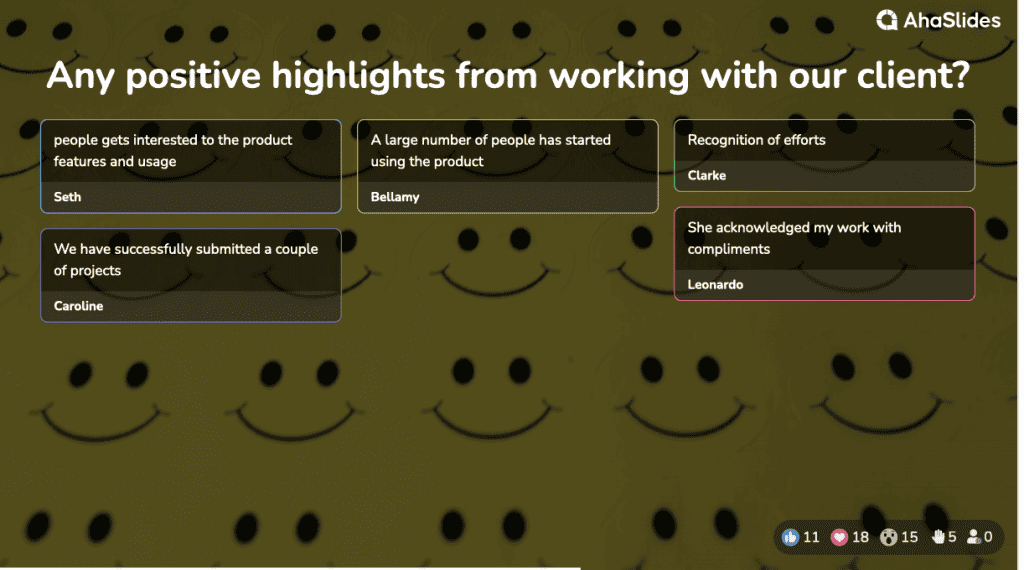不思議に思います 質問の仕方 きちんと? 良い質問をするには、思っている以上に努力が必要です。
正直に言うと、見知らぬ人と会話を始めるのは大変なことです。パーティーでジェニーがそうだったように、適切な質問を見つけるのに苦労する人は多いでしょう。 これは社交的な場だけでなく、会話を始めることが重要な生活のさまざまな側面にも当てはまります。
現代社会では、効果的な質問の仕方がわからないという人が多いのではないでしょうか。面接の結果についてフォローアップしたり、誰かの健康状態を確認したり、あるいは単に会話を盛り上げたりする場合でも、質問する能力は重要です。
この記事では、質問する力と優れた質問者とは何かを掘り下げ、質問テクニックを向上させるための実践的な戦略を探ります。

目次
エンゲージメントを高めるためのヒント
良い質問とは何でしょうか?
素晴らしい質問をするには、素晴らしい答えを探すことから始まると思われるかもしれません。 しかし、何よりもまず、 明確かつ簡潔な質問 は必須です。質問自体は、相手が混乱することなく、あなたの言いたいことを正確に理解できるように、要点を絞って始めるべきです。
第二に、 良い質問は関連性がある議論されているトピックや主題に関連した質問をする必要があります。無関係な質問をすると、会話やプレゼンテーションが脱線し、全員の時間を無駄にしてしまう可能性があります。そのため、質問が話題に関連していることを確認することが重要です。
第三に、 良い質問は自由回答です議論を促し、多様な回答が生まれるような質問にしましょう。「はい」「いいえ」で答えられるクローズドエンド型の質問は、会話を阻害し、得られる情報を限定してしまう可能性があります。一方、オープンエンド型の質問は、相手に意見やアイデアを共有してもらうよう促し、より深く生産的な議論へと導きます。
最後に、 素晴らしい質問とは、興味をそそる質問です 興味深く、好奇心を刺激することで聴衆を魅了します。 このような質問には、人々がディスカッションに積極的に参加し、独自の洞察やアイデアを共有することが奨励される、前向きで刺激的な環境を作り出す力があります。 魅力的な質問をすることで、より生産的で協力的な対話を促進し、当面のトピックについてのより深い理解につながります。
質問が得意な人は誰ですか?
疑問を抱くのは簡単な人もいますが、難しい人もいます。 なぜ質問するのが得意な人もいれば、質問が苦手な人もいるのか疑問に思ったことはありますか? 優れた質問をする能力は、誰もが持っているわけではない貴重なスキルであることがわかりました。
たとえば、心理学者のような専門家は、クライアントに自分自身や自分の人生についてより深く考えるよう促す、示唆に富む質問をする能力があることでよく知られています。 しかし、何が彼らをそんなに上手にしているのでしょうか?
これを戦略的アプローチとして捉え、優れた質問者として定義されるいくつかの特徴をチェックしてください。

積極的かつ共感的に話を聞く能力他の人の発言に注意深く注意を払うことで、聴衆の状況を明確にし、理解を深めるフォローアップの質問をすることができます。
突っ込んだ質問をする能力。 突っ込んだ質問は、思い込みに疑問を投げかけ、質問される人に自分の信念や視点について批判的に考えるよう促す質問です。 優れた質問者は、批判的でなく協力的な方法で、深く掘り下げた質問をする方法を知っています。これは、内省を刺激し、個人の成長を促進するのに役立ちます。
尋問における勇気 より深い洞察、理解、そして前向きな変化へと繋がります。好奇心とオープンな心を持って、自分のコンフォートゾーンから一歩踏み出し、勇気と感受性、そして質問を受ける相手への敬意をバランスよく保つことが求められます。
特定のシナリオで成功する戦略で質問する方法
人生で一番質問しづらい時ってどんな時ですか?もしあなたが以下の状況に当てはまるなら、ぜひ参考にしてみてください。そうでなくてもご安心ください。質問の仕方に必要なテクニックはすべて次のセクションで解説します。
質問の仕方 – 相手に話を聞いてもらう方法
誰かに話を聞きたい時は、相手の時間と境界線を尊重しつつ、明確かつ直接的に伝えることが大切です。ご自身の状況に合わせて使える例文をご紹介します。
- 「[具体的なトピック]についてお話しできればと思っています。近いうちにお話ししていただけますか?」
- 「[具体的な問題]について、あなたの洞察と見解を伺えれば大変ありがたく思います。お時間のある時に、この件についてお話しさせていただけませんか?」
質問の仕方 – フィードバックの求め方
個人的および職業上の成長の重要な部分として、私たちは友人、家族、同僚、マネージャーなど、周囲の人々からのフィードバックを求めることがよくあります。 そして、私たちは皆、正直でオープンな答えを得たいと思っています。質問の例を次に示します。
- 友人や家族から:「[名前]さん、あなたの意見はとても参考になるので、今取り組んでいる新しいプロジェクトについてフィードバックをいただけないでしょうか。何かもっと良い方法や改善点があれば教えてください。」
- お客様またはクライアントからのメッセージ:「[クライアント名]様、弊社は常にサービスの向上に努めており、最近のご利用に関するフィードバックをお待ちしております。特に気に入っていただけた点、あるいはご不満だった点、改善のためのご提案などございましたら、ぜひお聞かせください。」
関連記事:
質問の仕方 – ビジネスで適切な質問をする方法
ビジネスにおいて適切な質問や賢明な質問をしたい場合は、情報に基づいた意思決定を行い、成功した結果を達成することが重要です。 職場での質問の例は次のとおりです。
- 同様の状況にある他のクライアントに対してこのソリューションがどのように機能したかの例を教えていただけますか?
- このプロジェクトの成功を測定するためにどのような指標を使用しますか?
質問の仕方 – メールでプロフェッショナルに質問する方法
メールでプロフェッショナルな質問をする際は、明確かつ簡潔で、相手に敬意を払うことが重要です。メールでプロフェッショナルな質問をする良い例を以下に示します。
- 明確な質問のアプローチ: レポートをお送りいただきありがとうございます。 [特定のセクション] に関して簡単な質問があります。 [レポートの特定の部分] を説明していただけますか?
- 情報提供のための質問: このメールをお読みいただければ幸いです。 [トピック] に関する詳細情報をリクエストするために連絡しています。 具体的には、[具体的な質問] について興味があります。 この件について詳しく教えていただけますか。
質問の仕方 – メンターになってもらうよう頼む方法
誰かにメンターになってもらうのは怖いかもしれませんが、より経験のある人から学び、成長する貴重な機会でもあります。 誰かにメンターになってもらう方法の例を次に示します。
- 直接的なアプローチ:「こんにちは、[メンター名]様。あなたの仕事ぶりに大変感銘を受けており、あなたの経験と専門知識からぜひ学びたいと思っています。私のメンターになっていただけませんか?」
- 指導を求める:「こんにちは、[メンターの名前]さん。キャリアの中で、より経験豊富な方からの指導が必要な時期を迎えています。あなたの仕事ぶりには本当に感銘を受けており、素晴らしいメンターになれると思います。ご興味をお持ちいただけませんか?」
質問の仕方 – 相手が大丈夫かどうか尋ねる方法
誰かのことが心配で、大丈夫かどうか尋ねたいときは、思いやりと配慮を持って会話に臨むことが大切です。以下の例が参考になるかもしれません。
- 最近、あまりお静かにされているようですが、何かお話したいことはありますか?
- 大変な時期を過ごされているようですね。誰かに話を聞いてもらいたい時、あるいはただ気持ちを吐き出したい時、いつでも私に声をかけてください。
関連する
質問の仕方 – 面接の依頼方法
就職面接を依頼するには、そのポジションに対するあなたの熱意と能力を示す、機知に富んだプロフェッショナルなアプローチが必要です。 良い印象を与えるために、就職面接を依頼するための創造的で効果的な方法を以下にいくつか紹介します。
具体的な例を挙げますと、以下の通りです。
先週、[イベント/ネットワーキング ミーティング]でお会いできて光栄でした。[業界/企業] についてのあなたの洞察力に感銘を受けました。 私は [会社] に対する継続的な関心を表明し、関連する空きポジションへの面接をリクエストするためにこの手紙を書いています。
私のスキルと経験が[会社]に最適であると信じており、私の資格についてさらに話し合う機会を歓迎します。 私との面接をご予定していただける場合は、ご都合のよい時間をお知らせください。 電話でも直接でも、ご都合の良い方でお話しさせていただきます。
7 効果的な質問テクニック

求めているものを見つけるために、様々な質問テクニックを駆使しなければならない場合があります。それでも質問の仕方がわからない場合は、フォーマルな場面でもインフォーマルな場面でも使える、効果的な質問テクニックをいくつかご紹介します。
#1。 自由形式の質問をする自由回答形式の質問は、相手がより多くの情報を共有することを促し、より深い洞察と理解を引き出すのに役立ちます。これらの質問は、「何を」「どのように」「なぜ」といった言葉で始まることが多いです。
#2。 誘導的な質問を避ける誘導的な質問は、回答に偏りを与え、相手が本当の考えや感情を共有する機会を奪う可能性があります。特定の答えを暗示したり、特定の視点を前提としたりする質問は避けましょう。
#3。 内省的なリスニングを使用する: 振り返りの傾聴では、相手の言ったことを繰り返したり言い換えたりして、相手の視点を聞いて理解したということを示します。 これは信頼を築き、オープンなコミュニケーションのための安全なスペースを作り出すのに役立ちます。
#4。 フォローアップの質問をするフォローアップの質問は、情報を明確にし、話題をより深く掘り下げ、会話に積極的に参加していることを示すのに役立ちます。これらの質問は、「…についてもう少し詳しく教えていただけますか?」や「…とおっしゃるのはどういう意味ですか?」といった形で始まることがよくあります。
#5。 仮定の質問この種の質問では、回答者に仮想的な状況を想像し、そのシナリオに基づいて回答を求めます。例えば、「もし…だったらどうしますか?」
#6。 記号解析: Questions that focus on logical opposites, and attempt to learn what it is not, questions include “without”, ��not”, “no longer”,… can be used to explore different options and scenarios.
#7。 はしご 根底にある信念や価値観を探るための強力なツールとなり、他の人の動機や視点をより深く理解するのに役立ちます。 特にマーケティングや販売に役立ちます。
効果的に質問する方法: 7 つのヒント
質問することは、効果的なコミュニケーションと知識の獲得に不可欠です。しかし、ただ質問をすれば良いというわけではありません。適切な質問を、適切なタイミングで、適切な方法ですることが重要です。では、相手に好印象を残し、長く記憶に残るような質問をするにはどうすれば良いのでしょうか?あるいは、丁寧な質問の仕方とはどのようなものでしょうか?
魅力的で誠実でオープンな環境を作り出す効果的なコミュニケーションは双方向です。AhaSlidesの オープンエンドのプラットフォーム 人々がお互いのアイデアを交換し、提出し、最も優れたものに投票できる、活発な心に火をつけます。

あなたの目的を定義する: 質問する前に、自分の目標と、その目標を達成するために必要な情報について明確にしてください。 これにより、質問の焦点を絞り、無関係なトピックに時間を無駄にすることを避けることができます。
仮定を避ける自分が何を知っているか、あるいは相手が何を知っているかについて、決めつけないでください。代わりに、相手が自分の考えや洞察を共有できるように、自由回答形式の質問をしましょう。
具体的に: 明確で簡潔な情報で答えられる具体的な質問をします。 曖昧な質問や広すぎる質問は、混乱や非生産的な議論につながる可能性があります。
積極的に聞く適切な質問をするだけでは、成功への道は半分しか開けません。返答に耳を傾けることも重要です。話し手の口調、ボディランゲージ、そして返答のニュアンスに注意を払い、相手の視点をより深く理解しましょう。
質問を前向きかつ建設的に組み立てる: 否定的な言葉や非難的な口調の使用は避けてください。これは相手を守りの姿勢に陥らせ、生産的な会話に参加する意欲を失わせる可能性があります。
注目を集める: 目の前のトピックに集中し、無関係な問題に脇道にそれないようにします。 別のトピックに対処する必要がある場合は、それについて話し合うための別の会話をスケジュールしてください。
主要なポイント(要点)
あなたは今、質問の仕方について自分なりの答えと決断を持っているかもしれません。 次回あなたが質問しなければならない状況に陥ったとき、あなたはもう苦労する必要がないかもしれないことは完全に確かです。
よくあるご質問
良い質問方法は何ですか?
一度に XNUMX つずつ質問し、必要に応じて背景を説明します。 思いやりを持ち、熱心に取り組み、理解することに集中しているかどうかは、質問の仕方に表れます。
尋ねるべき10の質問は何ですか?
1. 楽しみのために何をするのが好きですか?
2. あなたの好きな映画/テレビ番組は何ですか?
3. 最近学んだことは何ですか?
4. 仕事や学校で一番好きなことは何ですか?
5. 子供の頃の一番の思い出は何ですか?
6. 夢の休暇先はどこですか?
7. あなたが本当に得意なことは何ですか?
8. 今年達成したいことを XNUMX つ挙げてください。
9. 週末のお気に入りのアクティビティは何ですか?
10. 今、あなたの人生で何か面白いことが起こっていますか?
どうすれば賢い質問ができますか?
事実に基づく回答だけでなく、より深い洞察を得るために、「なぜ」や「どのように」といった質問をしましょう。「なぜそれがうまくいったと思いますか?」「その問題をどのように解決しましたか?」など、話し手のコメントやアイデアに言及することで、積極的に耳を傾けていることを示しましょう。「Xについてお話されたとき、Yの質問が思い浮かびました」といった具合です。
Ref: HBYR








